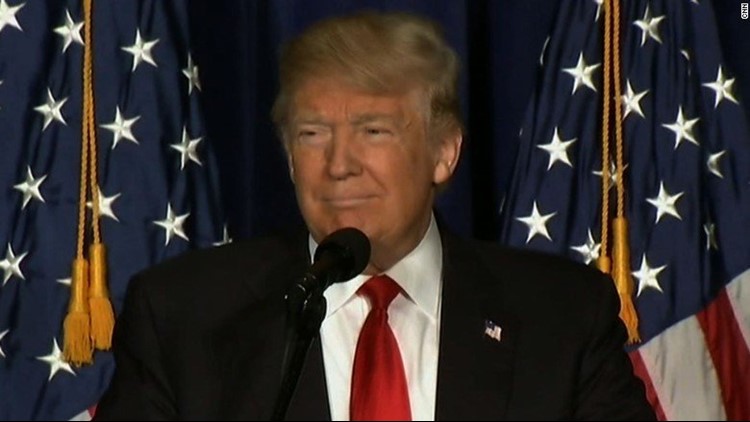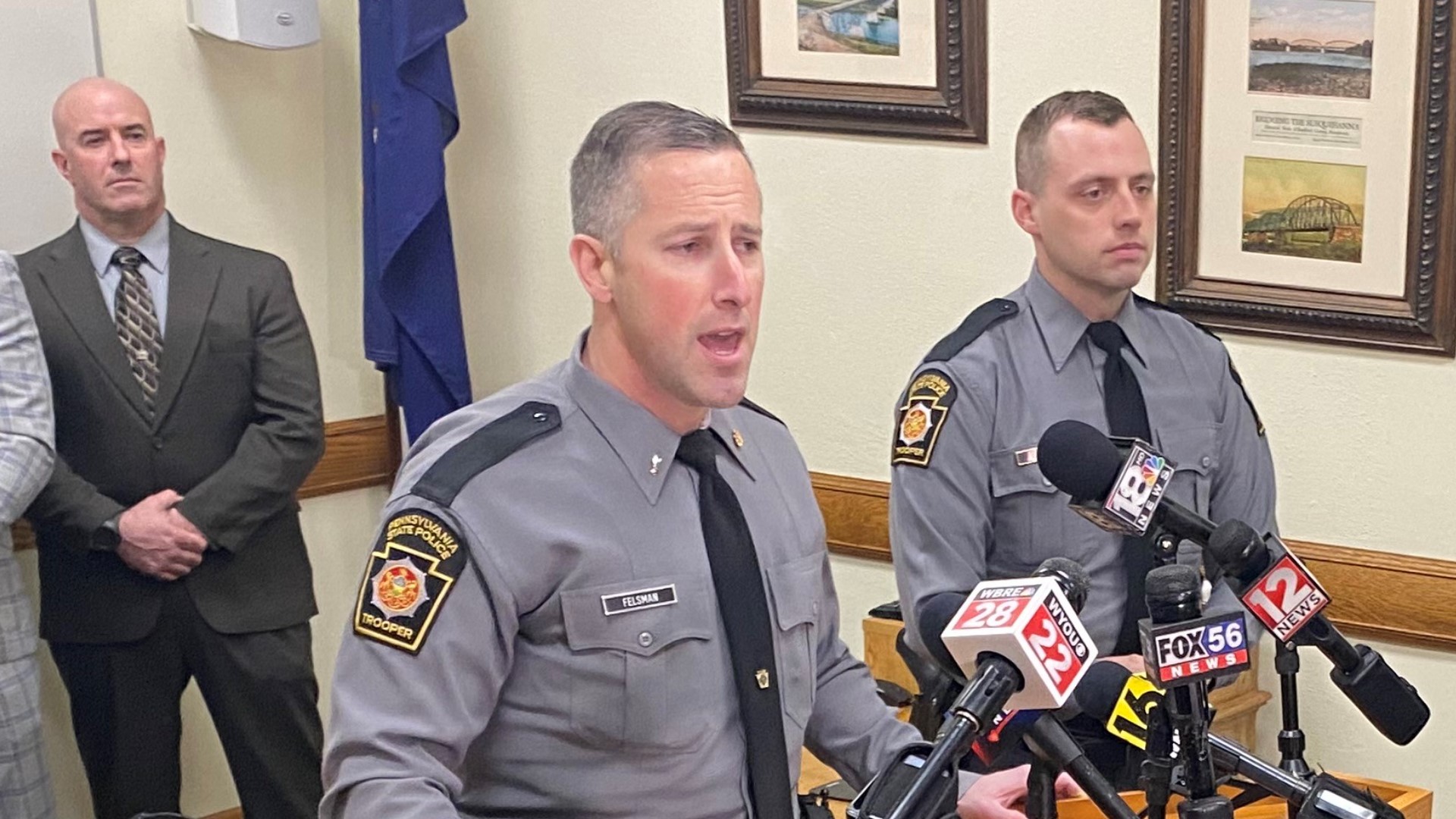WASHINGTON — Donald Trump on Wednesday delivered a major foreign policy speech in Washington, laying out his vision for a foreign policy that will put “America first.”
Trump opened his speech Wednesday vowing to “shake the rust off America’s foreign policy” and said he would outline a vision for a U.S. foreign policy “that replaces randomness with purpose, ideology with strategy and chaos with peace.”
He added, “My foreign policy will always put the interests of the American people and American security first.”
Speaking at the Mayflower Hotel as part of his campaign’s efforts to cast him as a more presidential figure and appeal to Republican Party elites., he opened the speech with measured tones and relied on prepared remarks in place of the off-the-cuff style he often deploys on the campaign trail.
Wednesday’s speech — which comes after Trump completed a five-state sweep on Tuesday, bringing him significantly closer to clinching the GOP presidential nomination — is the first in a series of policy addresses Trump will deliver in the coming weeks as he looks to show a different side of his typically brash persona.
Trump covered some familiar themes, however, in slamming President Barack Obama and Democratic front-runner Hillary Clinton.
He panned the Iran nuclear deal, a centerpiece of Obama’s foreign policy, and claimed the President has “weakened our military by weakening our economy.”
And he sought to wrap former secretary of state Clinton in his criticism of the Obama administration, referring to the “legacy of the Obama-Clinton interventions” as one of “weakness, confusion and disarray.”
At the same time, he offered an olive branch of sorts to Muslim allies of the United States in rare remarks pointing to the ways in which the U.S. can have constructive relations with the Muslim world.
“We’re going to be working very closely with our friends in the Muslim world, which are all at risk for violent attacks,” he said. His comments on Muslims and Middle East partners have been lightning rods throughout the campaign.
But he added that these countries also need to acknowledge America’s contributions.
“This has to be a two-way street,” he said. “They must also be good to us. It’s no longer one way, it’s two way.”
Trump has called for a temporary ban on Muslim foreigners entering the United States and suggested that U.S. Middle East allies need to shoulder more of the cost of American military involvement in the region.
In keeping with his “America first” theme, Trump vowed that his administration’s actions on trade would hinge on “jobs, income and security of the American worker.”
“We will no longer surrender this country or its people to the false song of globalism,” Trump said, explaining that he is skeptical of international agreements “that tie us up and bring America down.”
Instead, Trump vowed not to enter into any international accords that would reduce the U.S.’s “ability to control our own affairs.”
“Under a Trump administration, no American citizen will ever again feel that their needs come second to the citizens of a foreign country,” Trump said.
And he laid out stringent circumstances under which he would deploy U.S. troops into combat.
“I will not send our finest into battle unless necessary — and I mean absolutely necessary,” Trump said. “And I will do so only if we have a plan for victory with a capital V.”
Trump was introduced by Zalmay Khalilzad, President George W. Bush’s former ambassador to Afghanistan, Iraq and the permanent representative to the United Nations.
As well as plugging his new memoir, Khalilzad painted a dire picture of the world, “a period of withdrawal and retreat. Things can still get a lot worse.”
“We have been embroiled in several costly and protracted conflicts and the world has become more complex, unstable and dangerous,” he said, calling Trump a provocative voice in the debate over America’s place in the world.
The GOP candidate noted ahead of his remarks that they wouldn’t lay out an over-arching view of U.S. foreign policy.
He said during a news conference Tuesday night that there would be no “Trump doctrine” in his speech because “you have to have flexibility.”
“You may say one thing and then the following year you change it because circumstances are going to be different,” Trump said. “You can’t say, this is my doctrine, I will not move. Because countries change, leaders change.”
“It will be a speech on foreign policy, some of my ideas on foreign policy,” Trump told CNN’s Chris Cuomo Wednesday on “New Day.” “It will have to do with some of the economics of foreign policy because we are getting killed on economics. You know I’m an economic person. It’s one of my strengths.”
The billionaire businessman repeatedly pointed to that background in making the case that he is the best-equipped candidate to serve as commander in chief.
Trump frequently referenced his negotiating abilities, calling himself “the only one” who can fix the country’s problems. And he drew analogies between foreign policy and business.
“Businesses do not succeed when thy lose sight of their core interests and neither do countries,” Trump said.
The real estate mogul also expanded on his vision for a deeper American partnership with China and Russia, which have been viewed as on-again-off-again adversaries of the U.S.
“We are not bound to be adversaries. We should seek common ground based on shared interests,” Trump said of the two countries, though he has often railed against Beijing during the presidential race.
While Trump said “a strong and smart America is an America that will find a better friend in China,” Trump also did not paint the partnership as necessary, noting that “we can both go our separate ways, if need be.”
He closed by expanding on his trademark slogan: “We must make America respected again. We must make America truly wealthy again and we must, we have to and we will make America great again,” he declared. “And if we do that, perhaps this century can be the most peaceful and prosperous the world has ever ever known.”
A slate of veteran Republican operatives whom Trump hired in recent weeks, including his convention manager Paul Manafort, have encouraged Trump to cool his at-times heated rhetoric and plug more resources into Washington outreach.
Those efforts have faced a halting start as Manafort and Trump appeared at odds this weekend over the pace of that transition. As Manafort talked up Trump’s ability to morph into a more presidential figure to appeal to a broader audience, Trump at a rally the following day served up his characteristic brashness, complete with insults aimed at his presidential rivals.
Trump’s speech Wednesday may also help skeptical foreign policy experts drill down on the details of his vision for American foreign policy, which has often been scant on details.
To defeat terrorism, the Republican front-runner has vowed to “bomb the s— out of ISIS,” suggested he would target the families of suspected terrorists and vowed to bomb oil fields in a bid to deprive ISIS of a key financial resource.
Trump’s discussions of foreign policy on the campaign trail have primarily focused on trade, with the billionaire candidate calling for the U.S. to renegotiate what he deems are “stupid” and unbalanced free trade deals. Trump has also called for imposing a 35% tariff on goods imported by American companies who outsource their manufacturing overseas.
Trump’s most extensive remarks on foreign policy have come not in speeches on the campaign trail, but in interviews, including a pair of lengthy exchanges with The New York Times and The Washington Post’s editorial board late last month.
Trump’s speech Wednesday is the second time the real estate mogul has read a prepared speech. Trump first used the teleprompters he has so often derided on the campaign trail late last month when he addressed the annual gathering of the American Israel Public Affairs Committee.



